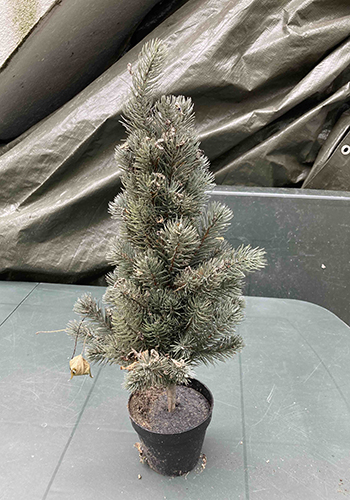
[Bu] ⌂
A Plastic Gymnosperm
[Ge] The beam touches a small artificial tree, a remnant of an old Christmas before covering the high branches of the buddleia.
[Bu] Plastic, in a garden, is not an unusual thing as this material is so widespread in our lives: garden hoses, table and chairs, tool handles, various pots, not to mention of course the one infiltrated in micro and nano particles in soil. But the discovery of a plastic plant, hidden in the greenery, left the company speechless.
Would I have identified this little fir tree in its pot as a « plant » if my companions had not pointed it out and taken it out of the shade of the trees where it was hiding? Probably not. A « plant », in my mind, is a living being (or that was). This, in my taxonomy, fell under objects, inert things made by humans, belonging to the same class as the other objects present in the garden. But aren’t some plants also human made?
[Ge] Apart from the snail, then, I note the presence of some kind of strange red mosquito that has landed on my knee, and then a plastic turtle.
[Bu] The material of which this turtle is made is questionable: it is not a basic obvious plastic, like the one of the tree ; it does not seem to be some sort of wood, neither ceramics. It seems to be a high quality resin, able to resist to outdoor conditions. But, well, resin is also plastic…
Contribution material from
[Bo] Karine Bonneval
[Bu] Annick Bureaud
[Ca] Lucie Campagnolo
[Ch] Quentin Chevrier
[Ci] Laura Cinti
[Qu] Kim Doan Quoc
[Fi] Eva Figueras Ferrer
[Ga] Teresa Garnatje Roca
[Ge] Lauranne Germond
[Ko] Tatiana Kourochkina
[Len] Loïc Le Noan
[Ma] Kristina Maurer
[Mi] Marit Mihklepp
[Na] Sophie Nadot
[Pr] Cyrille Prestianni
[Re] Mar Redondo Arolas
[Ro] Meredith Root-Bernstein
[Bu] Marc-André Selosse
[Ser] Perrine Serre
[So] Jean-Luc Soret
[To] Anaïs Tondeur
[Va] Joan Vallès Xirau
Roots & Seeds XXI. Biodiversity Crisis and Plant Resistance is an international cooperation project between Ars Electronica (AT), Leonardo/Olats (FR), University of Barcelona (ES) and Quo Artis (ES) as lead partner. It is co-funded by the Creative Europe Programme of the European Union. Leonardo/Olats has the support of the Daniel and Nina Carasso Foundation.
Quo Artis (SP lead partner), Ars Electronica (AT), Leonardo/Olats (FR), University of Barcelona (ES).
Project developed with the support of the Creative Europe Programme of the European Union.


Leonardo/Olats
Observatoire Leonardo des Arts et des Techno-Sciences
À propos / About | Lettre d'information Olats News



Pour toute (re)publication, merci de contacter / For any (re)publication, please contact Annick Bureaud: info@olats.org
Pour toute question concernant le site, merci de contacter / For any issue about the website, please contact: webmaster@olats.org
Design Thierry Fournier
© Association Leonardo 1997-2022